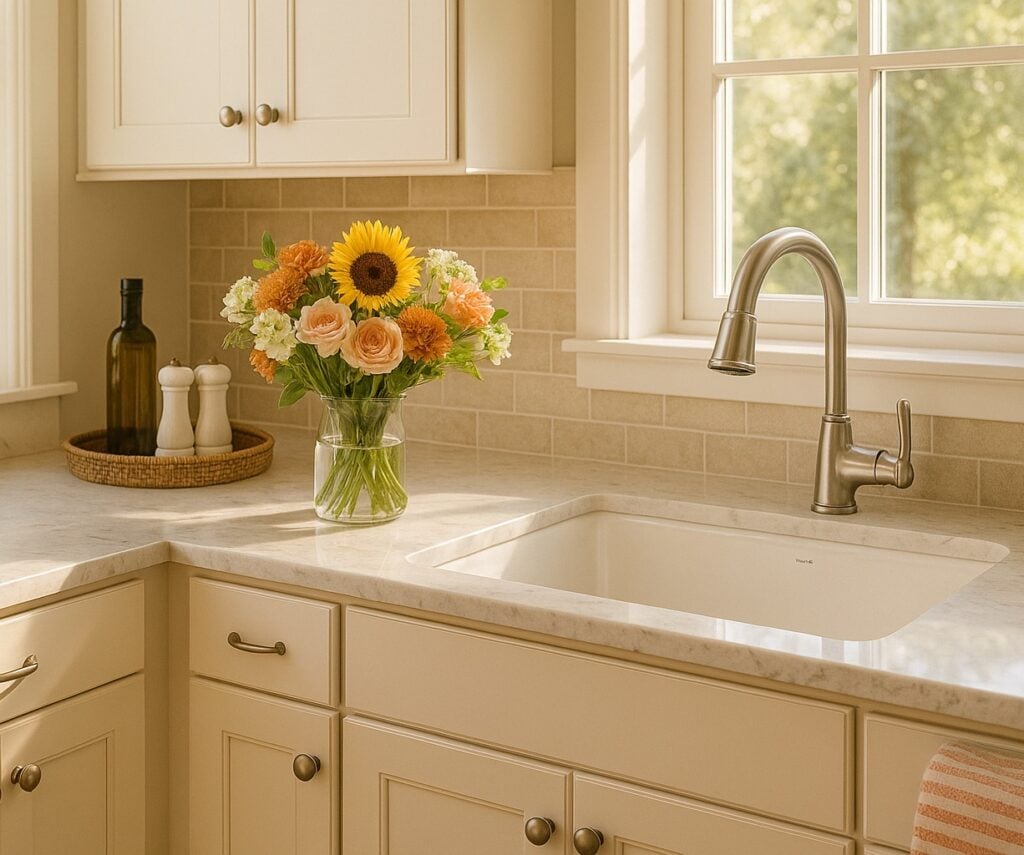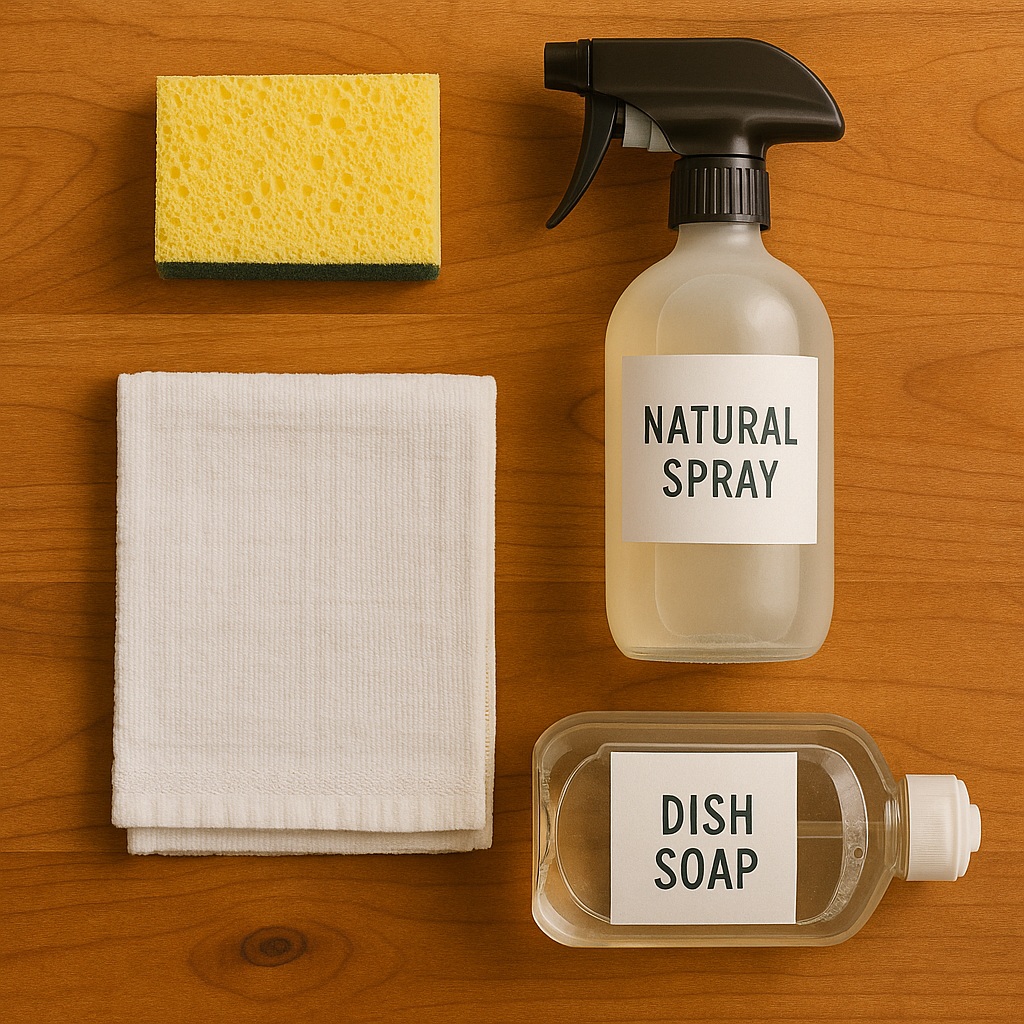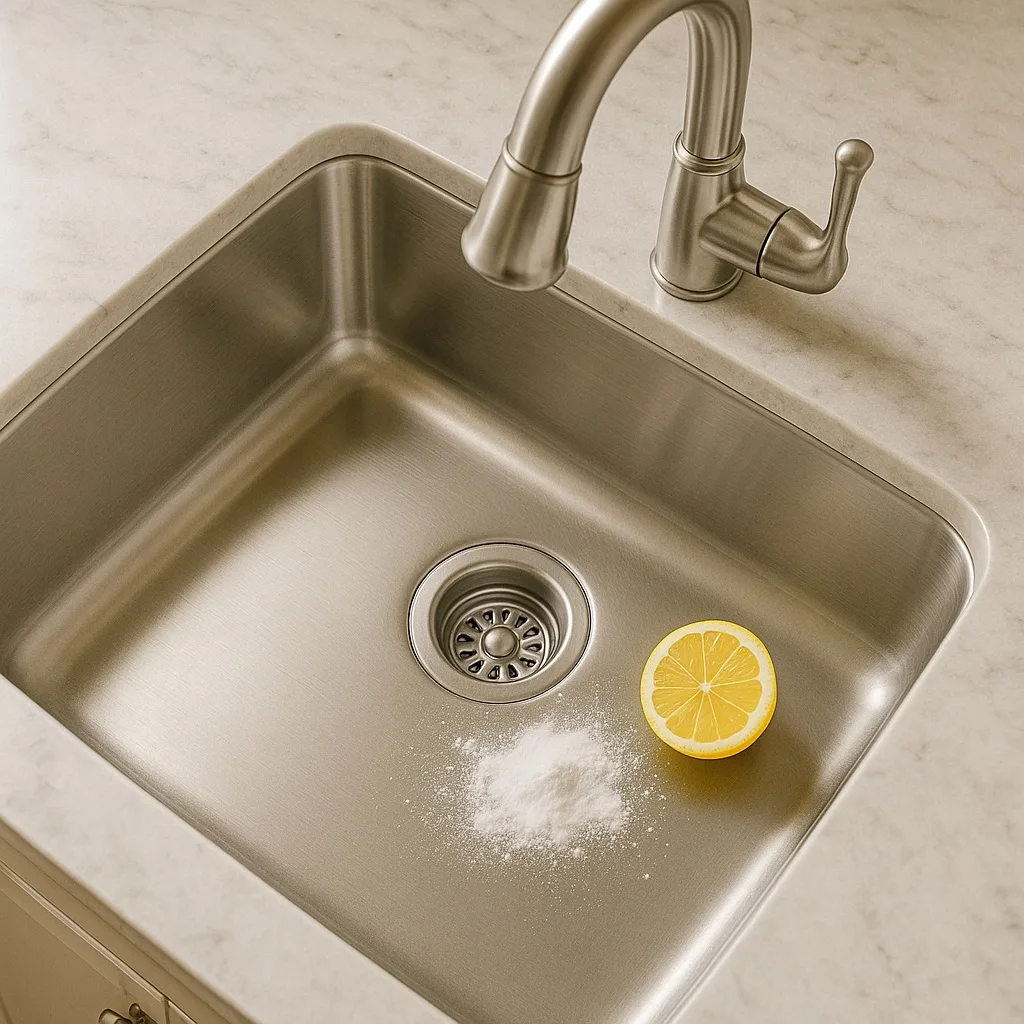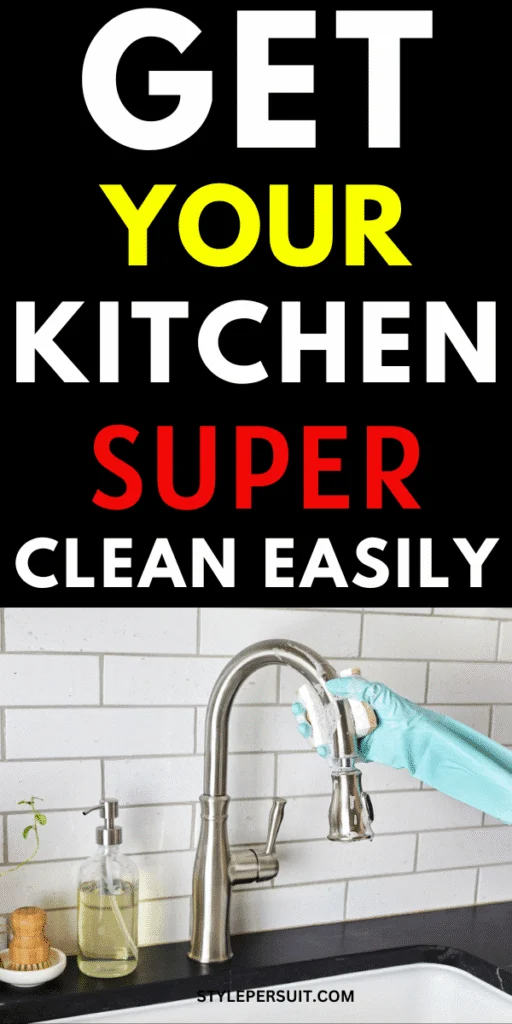There’s something comforting about walking into a kitchen that feels fresh, tidy, and ready for action.
The counters aren’t sticky, the sink doesn’t smell, and the cabinets don’t leave a greasy film on your fingers.
But let’s be honest, most of us don’t always keep it that way. Life gets busy, and the kitchen ends up being a magnet for clutter, crumbs, and mystery stains.
Here’s the thing: the importance of cleaning the kitchen goes way beyond appearances.
It’s about food safety, your family’s health, and yes, even your sanity. Studies have shown that messy environments can increase stress levels.
And if you’ve ever tried to cook dinner while searching through a pile of dirty dishes for a cutting board, you know exactly how stressful it can feel.
There are also practical reasons for cleaning the kitchen that people don’t always think about. Grease buildup in your vent can actually be a fire hazard.
A neglected sink drain can start to smell, and not in the “freshly baked cookies” way. Leftover crumbs in your cabinets? That’s like sending engraved invitations to ants and roaches.
So, if you’ve ever wondered why cleaning is important in the kitchen, the answer is simple: it’s the foundation of a healthier, calmer home.
And the good news? With the right system, it doesn’t have to take hours. In fact, the tips below will help you clean smarter, not harder.
Should You Keep Your Kitchen Clean? (Spoiler: Yes, Here’s Why)

Sometimes, people ask if it’s really necessary to keep the kitchen spotless every day. Honestly, it depends on what “spotless” means to you.
But no question, keeping the kitchen clean pays off in ways you can feel immediately.
A wiped-down counter means you don’t have to worry about bacteria hanging out on yesterday’s spills.
A sink cleared of dishes means no foul odors greet you in the morning.
There’s also the emotional side. Walking into a neat kitchen feels inviting—it makes you want to cook instead of ordering takeout again.
Think of it as setting the stage: if the kitchen is messy, you’re less likely to want to spend time there, which can lead to more waste and unhealthy food choices.
Amazon picks to help:
- Microfiber Cleaning Cloths – They pick up grease and crumbs without leaving streaks.
- All-Purpose Spray with Plant-Based Ingredients – Safe for counters where food is prepped.
How Often Should You Clean Your Kitchen?
Here’s a question that pops up a lot: how often should you clean your kitchen? The answer isn’t one-size-fits-all, but here’s a simple breakdown:
- Daily: Dishes, wiping down counters, quick sweep of the floor.
- Weekly: Mop floors, scrub the sink, clean the stove, wipe cabinet fronts.
- Monthly: Clean vents, organize pantry, sanitize trash bins.
- Seasonally: Full deep clean, think inside cabinets, fridge coils, oven.
The trick is to build habits so it doesn’t pile up. For example, wiping the stove after dinner takes 30 seconds and prevents the dreaded baked-on mess that takes half an hour to scrub later.
Amazon picks to help:
- Kitchen Timer or Alexa Echo Dot – Set small reminders for daily/weekly tasks.
- Reusable Mop Pads – Eco-friendly and easy for weekly floor cleaning.
Keeping the Kitchen Clean With Small Daily Habits
You don’t need to overhaul your routine to make a difference. It’s about small habits.
Keep a sponge by the sink and give it a quick scrub every night; otherwise, it becomes a bacteria party. Put a bowl of baking soda in the fridge to neutralize odors.
Empty the trash before it’s overflowing; otherwise, you’ll start resenting it.
Here are a few methods of cleaning the kitchen that fit seamlessly into daily life:
- The “while you cook” rule: Wash utensils and bowls as you go.
- The 5-minute reset: Before bed, clear counters and wipe the sink.
- The clutter basket: Keep a small bin for mail, random items, and papers so they don’t spread across the kitchen.
It’s not about perfection, it’s about keeping messes from spiraling. If you spend just 10 minutes a day, you’ll rarely feel the need for marathon cleaning sessions.
Amazon picks to help:
- Sink Caddy Organizer – Keeps sponges, brushes, and soap neat.
- Natural Baking Soda Cleaner – Safe for scrubbing the sink and stovetop daily.

How to Clean Your Kitchen Vent Without Making a Greasy Mess
If you’ve ever looked up at your stove vent and thought, “Yikes, when did it turn yellow?”—you’re not alone.
Kitchen vents collect grease faster than you’d expect. And the worst part? They don’t just look gross, they also trap odors and reduce airflow.
How to clean your kitchen vent:
- Remove the filters – Most pop right out.
- Soak them in hot, soapy water with a cup of baking soda. Let them sit for 15–20 minutes.
- Scrub gently with a soft brush.
- Rinse and dry before putting them back.
For the hood surface, spray with a degreaser or a mix of vinegar + water, then wipe until it shines.
Amazon picks to help:
- Degreasing Spray for Kitchen – Cuts through stubborn buildup.
- Soft Bristle Cleaning Brush – Gentle enough for vent filters.
How to Clean Your Kitchen Cabinets (and the Cabinet Doors Too)
Cabinets are sneaky, they look fine until you run your hand along the surface and feel the sticky film. That’s a mix of grease, dust, and fingerprints that builds up over time.
How to clean your kitchen cabinets and cabinet doors:
- For wood cabinets: Mix warm water with a few drops of dish soap. Use a microfiber cloth to gently wipe surfaces. Dry immediately to avoid warping.
- For painted or laminate cabinets: A vinegar-and-water solution works wonders.
- For stubborn grease spots: A paste of baking soda + water will gently scrub it off without scratching.
And don’t forget the cabinet handles, things harbor more germs than you think.
Amazon picks to help:
- Wood Polish and Cleaner – Great for keeping wood cabinets looking fresh.
- Microfiber Cloth Pack – For streak-free cleaning.
How to Clean Your Kitchen Sink (and Don’t Forget the Drain & Pipes)
Here’s the truth: your kitchen sink is dirtier than your toilet. I know, not what you wanted to hear, but it makes sense when you think about raw meat juices, food scraps, and standing water all going down there.
How to clean your kitchen sink:
- Scrub with a paste of baking soda and water to deodorize.
- Rinse with hot water and vinegar to cut through residue.
- Wipe dry to prevent water spots (especially for stainless steel).
How to clean your kitchen sink drain & pipes:
- Pour a cup of baking soda down the drain.
- Follow with a cup of vinegar. Let it fizz for 10 minutes.
- Flush with boiling water.
This not only freshens the drain but also helps clear gunk in your sink pipes. If you’ve got a garbage disposal, toss in some lemon peels and ice cubes; it sharpens the blades and deodorizes at the same time.
Amazon picks to help:
- Stainless Steel Sink Cleaner – Restores shine.
- Drain Cleaning Brush Kit – Reaches down pipes to pull out hair/food buildup.

How to Clean Your KitchenAid Dishwasher (So It Actually Smells Fresh)
Weird but true—dishwashers can get dirty. Soap scum, leftover food, and hard water buildup leave your plates smelling less than fresh.
If your dishwasher ever smells musty, it’s time for a clean.
How to clean your KitchenAid dishwasher:
- Empty it completely.
- Remove the filter at the bottom, rinse under hot water, and scrub with a toothbrush.
- Run a hot cycle with a dishwasher cleaner tablet or a cup of vinegar in the top rack.
- Deodorize by sprinkling baking soda along the bottom and running a short cycle.
This keeps it running efficiently and stops that sour smell from clinging to your “clean” dishes.
Amazon picks to help:
- Active Dishwasher Cleaner Tablets – Specifically recommended for KitchenAid dishwashers.
- Lemi Shine Booster – Helps with hard water stains.
Wiping Down Countertops the Right Way
Countertops are ground zero for crumbs, spills, and sticky rings from that one glass no one admits leaving behind.
But the cleaning approach depends on the material.
- Granite & marble: Use a pH-balanced cleaner (vinegar can actually etch the surface).
- Quartz & laminate: A few drops of dish soap in warm water do the trick.
- Butcher block: Wipe with vinegar, then condition with mineral oil.
The trick is daily maintenance—wipe as you go. A single swipe after cooking saves you from that Saturday morning scrub-fest.
Amazon picks to help:
- Granite & Stone Cleaner – Safe for natural stone.
- Food-Grade Mineral Oil – Keeps butcher block counters hydrated.
Refrigerator Reset: Keeping the Cold Zone Clean
Your fridge is where spills go to die. A forgotten yogurt cup, a sticky jam jar—suddenly you’re dealing with a biohazard.
Cleaning the fridge sounds overwhelming, but breaking it into steps helps.
Step-by-step fridge cleaning:
- Take everything out (yes, even the ketchup).
- Toss expired or questionable items.
- Remove shelves and bins, wash them in warm, soapy water.
- Wipe the inside walls with a baking soda + water mix.
- Put everything back in an organized way (group condiments, dairy, produce).
A quick deodorizer trick? Place an open box of baking soda in the back corner to absorb odors.
Amazon picks to help:
- Fridge Deodorizer Packs – Better than just baking soda boxes.
- Clear Fridge Storage Bins – Helps keep everything neat and spill-free.
How to Clean Your Kitchen Fast (When Company’s on the Way)
Sometimes you don’t have the luxury of a full scrub-down—you need the kitchen to look spotless in 15 minutes. Here’s how:
- Clear the counters – Put clutter in a basket to deal with later.
- Do a quick dish sweep – Load the dishwasher or stack neatly in the sink.
- Wipe visible surfaces – Counters, stovetop, and sink.
- Spot mop the floor – Just the high-traffic areas.
- Light a candle or boil some lemon slices – Makes the space smell instantly fresher.
This isn’t deep cleaning, but it’s the kind of reset that makes guests think you’ve got everything under control.
Amazon picks to help:
- All-Purpose Cleaning Wipes – For quick touch-ups.
- Lemon-Scented Candles – Doubles as décor and freshness.
Kitchen Floors: The Final Frontier of Crumbs and Spills
Floors collect everything: flour dust, pet hair, mystery stickiness you swear wasn’t there yesterday.
How often should you clean your kitchen floor? Honestly, a quick sweep or vacuum daily (or every other day if you don’t cook often) and a deeper mop once a week keeps things under control.
- Tile floors: Warm water + mild detergent works best.
- Hardwood: Stick to wood-safe cleaners—too much water can warp.
- Vinyl or laminate: A gentle, no-rinse cleaner keeps shine without streaks.
Pro tip: A cordless stick vacuum is a game-changer. You’ll grab it way more often than a broom.
Amazon picks to help:
- Cordless Stick Vacuum – Lightweight, perfect for quick cleanups.
- Reusable Microfiber Mop Pads – Washable, eco-friendly, and effective.
Don’t Forget the Trash Bin
Trash bins are sneaky clean-looking on the outside but horror movie territory inside. Spilled coffee grounds, meat juice leaks, that one forgotten banana peel… they add up fast.
How to keep it fresh:
- Rinse your bin weekly with warm, soapy water.
- Spray with a vinegar-water solution and let it dry completely.
- Sprinkle baking soda in the bottom before adding a new bag.
- Use bin liners that actually fit (no more bag slip disasters).
Little trick? Keep a stash of extra bags at the bottom of the bin, so you’re never hunting for one.
Amazon picks to help:
- Drawstring Trash Bags – Heavy-duty and leak-proof.
- Deodorizing Trash Can Filters – Stick-on freshness boosters.
How to Sanitize Your Kitchen (Without Going Overboard)
Here’s the thing: not everything needs to be disinfected daily, but some areas demand attention. Think sink handles, cutting boards, fridge handles, and light switches.
- Cutting boards: After raw meat, scrub with hot water + dish soap, then sanitize with diluted bleach or vinegar.
- Sinks & faucets: Spray with a disinfectant, let it sit for 5 minutes, then wipe.
- High-touch surfaces: A quick spritz of disinfectant wipes works wonders.
The trick is to balance, you want to reduce bacteria without dousing your kitchen in chemicals every 30 minutes.
Natural sanitizers like vinegar or hydrogen peroxide can handle most jobs without the harsh fumes.
Amazon picks to help:
- Food-Safe Disinfectant Spray – Safe for surfaces you prep food on.
- Hydrogen Peroxide Cleaner – A solid natural alternative.
How to Maintain a Clean Kitchen (Without Feeling Like It’s a Full-Time Job)
Here’s the secret: a clean kitchen isn’t about marathon scrubbing sessions, it’s about daily habits that keep the mess from piling up.
Think of it as “cleaning in the margins.”
Some simple maintenance routines that make all the difference:
- The 10-minute evening reset – Before bed, wipe counters, load dishes, and take out the trash.
- Clean as you cook – Rinse cutting boards and utensils instead of letting them pile up.
- Weekly wipe-downs – Pick one “extra” task per week (cabinet doors, fridge, backsplash).
- Set a timer – Cleaning feels lighter when you know it’s capped at 15 minutes.
Consistency beats intensity. Your kitchen stays clean-ish every day instead of spotless once a month and chaotic in between.
Amazon picks to help:
- Magnetic Kitchen Timer – Keeps cleaning bursts short and sweet.
- Multi-Surface Spray Kit – One product for almost everything.
Why Is Cleaning Important in the Kitchen?
It’s not just about appearances, though, walking into a gleaming kitchen does feel amazing. A clean kitchen touches every part of daily life:
- Food safety: Fewer germs = fewer chances of foodborne illness.
- Peace of mind: Cluttered counters equal a cluttered head.
- Time-saving: You cook faster when you’re not digging for a clean pan.
- Longevity: Appliances, cabinets, and even flooring last longer when cared for.
And then there’s the emotional piece. The kitchen is often the heart of the home—where kids do homework at the counter, where friends lean in for conversation while you stir a pot.
Keeping it clean doesn’t just protect your health; it preserves the atmosphere.
Amazon picks to help:
- Kitchen Organization Rack – Cuts clutter instantly.
Wrapping It All Together
So, how to properly clean a kitchen? It’s less about scrubbing harder and more about working smarter.
From deep-cleaning your vent and sink pipes to quick resets before guests arrive, every small habit builds toward a space that feels fresh, functional, and welcoming.
And should you keep your kitchen clean? Yes. Not for the Pinterest-perfect pictures, but because it’s where real life happens: meals, memories, late-night snacks, messy baking sessions, and all.
If you take anything away from these 15 expert tips, let it be this: cleaning doesn’t have to feel like punishment.
With the right products, a little rhythm, and a pinch of consistency, your kitchen can stay spotless without stealing your weekends.

